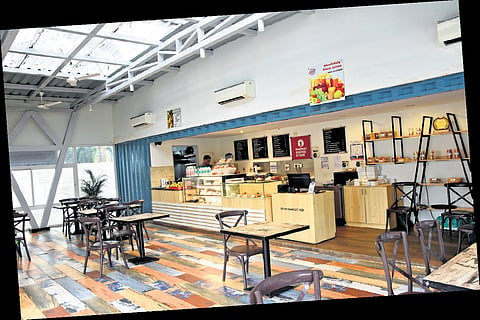

CHENNAI: "Oru jeevan thaan, Un paadal thaan, Ooyaamal isaikkindrathu, Iru kannilum un gnyaabagam,’ (one soul is singing your song. Both eyes remember you) croons Chithra, eyes closed, lingering on the low notes. Tamil film songs — apart from this stellar hit from Naan Adimai Illai (1986) — and the sound of deft chopping, and sizzling fills this serving staff and her colleagues’ six-hour shift daily at the quaint RVIVE Bakery and Cafe in Kilpauk. Working beside her, Shakthi delivers his soft rendition of Yesudas’ Agaram Ippo Sigaram Aachu to which Chithra points out, “See, he sings so well!”
Over the past three years, Chithra has helped open the airy, sunlit cafe every morning at 9 and proceeds to mark off a list of her daily chores till noon. The 45-year-old chops vegetables, mops floors, brews and serves cups of coffee, and greets customers with warm gestures to make them comfortable. Caricatures of Sigmund Freud, and Shakespeare, among others on an off-white wall, a line-up of pastries, flaky puffs, and chicken wings, and a list of specials entice the customers.
“Our days in the cafe are jolly like this, yet, in our life, not many would give patients like us jobs,” points out Chithra, who lives with mental illness. In 2021, she was employed at RVIVE, a community cafe — launched by the Institute of Mental Health (IMH) and Chennai Mission, founded by M Mahadevan — to mainstream the employment of persons living with mental illness.
Chithra is among the 26 persons living with mental illnesses such as schizophrenia, psychosis, and mood disorders who stay at IMH lodgings and are deployed at several places of work including Winner’s Bakery, RVIVE, and Hot Breads. According to the Global Burden of Disease Study 1990–2017 in The Lancet, around 197.3 million people had mental disorders in India, as of 2017. Amid stereotypes, and lack of awareness, employment for persons with mental illnesses is far and few. This year’s theme of World Mental Health Day (October 10), highlights the importance of ‘mental health at work.’
Intricacies at work
According to the WHO, “safe, healthy working environments can act as a protective factor for mental health. Unhealthy conditions — including stigma, discrimination, and exposure to risks like harassment — can affect mental health.”
But what does work mean to persons living with mental illnesses? For those from marginalised communities, abandoned by families, without documentation, how crucial is work?
“Work means something that generates an income so we can meet our lives’ requirements. Clothes, food, and out-of-pocket expenses,” explains Srinivasan, another serving staff member who lives with a mental illness. Apart from establishing independence and boosting self-confidence, the 54-year-old points out that it allows access to obtaining documentation like Aadhaar Cards, opening bank accounts, and socialising with colleagues. While for some, earning means feeding their families, others save up and hop on a train for solo trips, escaping the daily grind.
Coupled with a lack of job opportunities, persons with mental illness who are employed also have to navigate through the challenges of discriminatory practices at work and having to hide their condition. “I was with IT and software companies, I relapsed into mania and I was practically homeless, my brother and family cut off ties with me and threw me onto the street and they (IMH) found me and rehabilitated me,” adds Srinivasan.
Apart from accounting for daily expenditures, the server has saved over time and purchased a laptop. With this system, he sketches digital portraits, animates, and nurtures a dream to one day pen a novel. Earning around `7,000 a month, Chithra — who has a penchant for roses — buys cherished items, gold rings, earrings, and necklaces. “All our money comes from hard labour, we see this as a good profit.”
Shakthi, who has been working at RVIVE for four months, sends his entire salary back to his parents. While a frustrated Chithra quips, “He doesn’t keep a single penny, and doesn’t have any money for a cup of tea.” The 29-year-old responds, his dream is to live happily with his family. Another dream of Shakthi’s is to meet Thalapathy Vijay. However, some dreams cannot be achieved with a steady flow of income.
Employment proves to be a treatment for mental illness, boosting their confidence, and self-esteem that aids in recovery, says Dr M Malaiappan, professor of psychiatry at Madras Medical College and currently the director of IMH. “Once they recognise they are useful, they can spend money and give money to their family that previously rejected them. This helps in the recovery process along with medicine and psychotherapy.”
Treatment coupled with group homes, and supported housing is important, says the director. He adds that the staff members must be checked once in 15 days, to monitor their condition and medication. “Recovery is a spectrum. Depending on recovery, we tailor our interventions, according to the needs of the patients, severity of illness, and degree of improvement. It is teamwork between social worker, psychiatrist, and psychologist,” he adds.
While buzzwords like accessibility, and inclusivity fill corporate settings, there is a long way to go. For potential employers and stakeholders, Srinivasan says, working with persons with mental illness requires sensitivity and patience. “Stereotypes are relied upon, and society follows opinions based on that but each individual is different. Sensitisation about persons with disabilities and mental illnesses should be taken. Most people are intelligent, capable, and are looking for a chance to do better in life,” he signs off.